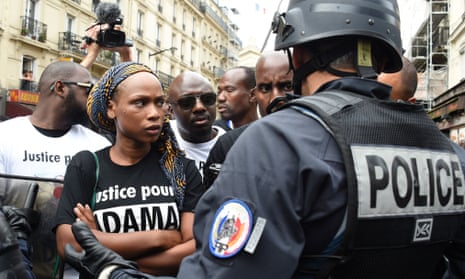I despair. Some white people have got so upset about their exclusion from parts of the Nyansapo festival, an intersectional black feminist gathering scheduled for 28-30 July in Paris, that the mayor of the city called for the festival to be banned, until organisers clarify details with her, and anti-racist groups have claimed that Rosa Parks would be “turning in her grave” at the event.
In the same week that some men have kicked up a fuss over not being allowed to attend women-only film screenings of Wonder Woman it seems a discussion is needed as to why spaces that are centred around marginalised groups, whether they be women or people of colour, are not racist or sexist.
Unofficial safe spaces have existed for all denominations for centuries, and self-organising has long been a key part of anti-racist and feminist movements. As one of the editors for gal-dem, a magazine and creative collective written and produced exclusively by women of colour, I think about our position of racial exclusivity a lot. In some ways I appreciate it might be difficult to grasp why such spaces feel so necessary. The simplest way to understand why the Nyansapo festival has elements that aren’t open to white people (the festival is split into three areas, one specifically for black women, another for black people, and a third for everyone) is to acknowledge the racism we suffer in western society. There’s no moving forward unless we accept that racism against people of colour is deeply systemic.
It’s why you see incidents such as a French police officer accused of anally raping a young black man with a truncheon in Bobigny while beating him up and claiming it was “accidental”. At the same time studies show that each year in France between 10 and 15 people, who tend to be black or north African, die following police encounters, and that young men perceived as Arab or black are 20 times more likely to go through the French equivalent of stop and search.
In contrast to Nyansapo, self-organised “white spaces” – think far-right groups – are almost always layered with prejudice and the flawed notion of ethnic superiority. They are made in opposition to diversity and multiculturalism – and that, coupled with the uniquely powerful positions white people hold in society, is why they are unacceptable and reek of segregation. Black-only spaces rarely exist for the same purpose; instead they are founded on the basis of the true lived experiences of struggle. By denying white people entry to them we are not reflecting existing power structures, we are trying to subvert them.
This is certainly the case for the Nyansapo festival, which is organised by Mwasi, a black feminist organisation formed in 2014 by those who felt underrepresented in the French anti-racist scene. The festival will be the first one Mwasi has held, and apparently the first black feminist festival in France. Its aim is to create safe spaces with the opportunity to discuss black feminism, anti-racism, Islamophobia, homophobia, transphobia and other forms of systemic oppression.
Speaking to me on the phone from Paris, one of Mwasi’s members, Cyn, said of its critics: “Have any of these people ever had a problem renting out an apartment? Have they ever been overqualified for a job position and still not been hired? Have they ever been followed in a store? Have they ever been flunked by a teacher in a university because of their race? Ask yourself if you have ever been discriminated against for your gender, for the colour of your skin when searching to do the very everyday, basic things that people of colour try to do, where we find resistance, violence and hate. Maybe then you’ll understand.”
We have black awards shows because black people – even Beyoncé – get overlooked for awards time and time again. We have BAME book awards such as the Jhalak prize because out of thousands of titles published in 2016, fewer than 100 were by British people of colour. We have magazines written by women of colour because journalism is still 94% white and 55% male. We have Black History Month because our history is often not a part of the curriculum. And we have black feminist festivals because racism against black people and sexism against women are still ingrained in ex-colonial countries such as France and the UK. Until that changes, there can be no comparison with the concept of a “whites only” space.

